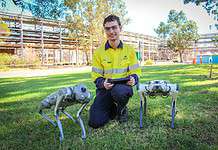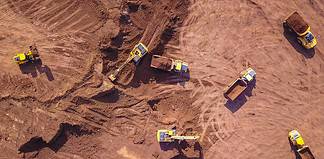BY CAMERON DRUMMOND
Last month, R U OK? initiative the Conversation Convoy began its six week journey around Australia. This 14,000km, 20 community tour aims to give more people confidence to support those who are struggling, while raising awareness of support services across the country. R U OK? chief executive Brendan Maher explains.
Q: How has RUOK?’s The Conversation Convoy been tracking?
It’s been going really well. The communities we have visited have been highly receptive to our message and focus of reinforcing the 4-steps to having a conversation with someone who might be struggling with life.
Q: Working conditions in the mining industry (FIFO, remote locations) can create situations where the mental health of employees could be at risk. What warning signs can employers look for, and what preventative measures can be put in place?
Of course, and this is true of any workplace.
Many people we work alongside have issues going on in their lives that we know nothing about. It could be relationship issues, parenting issues, illness, addiction, grief, mental illness, loneliness, and stress – any number of things.
Our personal resilience and ability to get through these challenges is very different. What might be a small speed bump for one person could be a major crisis for another.
As an employer or colleague, noticing a change in a workmates behaviour might be an indication that someone isn’t doing so well:
Maybe they’re running late all of a sudden when normally they’re a very punctual person.
Maybe the quality or care for their work has declined.
Maybe they’re more tired than usual.
Maybe they’re quick to anger or have a stronger emotional reaction than a situation deserves.
Maybe they’re eating more or less than usual.
Maybe it’s not obvious, but they’re just not themselves.
Of course we acknowledge that the nature of FIFO work has its unique challenges.
Long periods away from home, long hours, isolation, loneliness can all add to the stressors.
As employers, taking a genuine interest in your staff, creating a workplace where it’s ok to stick your hand up if you’re struggling, building a strong narrative about emotional well-being into workplace communications and reinforcing help seeking pathways such as EAP services can be really helpful in strengthening resilience.
Q: As a largely male-dominated industry, does the perceived ‘bravado’ of the mining industry create unique challenges to helping people in need?
For sure. We’ve come a long way over the last decade but helping others is still held hostage by stigma, fear of saying the wrong thing, a concern that ‘It’s none of my business’.
The truth is, just showing someone that you care enough to have noticed that they’re not themselves can help them feel less alone, and perhaps be a turning point for helping to improve their situation.
Q: How do high-stress work environments affecting a person’s mental health impact on other areas of their life?
A little bit of stress can be healthy. It can keep us productive, on time and focused.
It’s when stress becomes prolonged or chronic that it can have a really negative impact on us.
Loss of sleep, increased consumption of alcohol and or drugs, eating more or less, smoking more, poor diet, lack of exercise because ‘too busy’, not being present in relationships, working too many hours or switching off.
All of this can have an impact on our emotional wellbeing and mental health.
The good news is, we can do things to better manage our stress.
Speaking up if we’re getting overwhelmed. Regular exercise. Less alcohol, no smoking, healthier diet and exercise. Seeking help. Visiting a GP if you’re experiencing loss of sleep other symptoms.
Q: What can we as a society do to get the conversation about mental health to the forefront?
I think we’re getting there but perhaps we could better bring the conversation out of the shadows by being more honest with each other about where we’re really at, and being more compassionate with people who are doing it tough.
I think as a society, we could all do better at not labelling people who are experiencing mental illness; after all, its nothing to be ashamed of, nor afraid of if you’re supporting or caring for someone.
What is the Conversation Convoy?
The Conversation Convoy is building on the question “are you ok?” by reinforcing the 4 Steps to a conversation – asking, listening, encouraging action, and checking in.
A series of community-based events and activities will help people of any age learn the steps in a fun and interactive way.
High profile ambassadors will be joining different legs of the trip including Ben Lee, Khan Porter, Commando Steve, Daniel Conn, Steven Oliver, Travis Collins and Jodhi Meares.
Psychologist and R U OK? advisor Rachel Clements said that the barriers to asking are normal fears.
“We know that some conversations can be really tough. But in reality, you don’t have to be an expert to start a conversation – asking shows someone you care about them and that can make a really positive difference in their life,” Ms Clements said.
More information and campaign materials can be found at ruok.org.au.








































